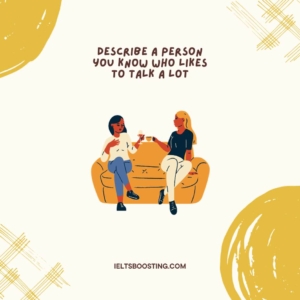Describe a person you know who likes to talk a lot
You should say:
Who this person is
How you knew this person
What he/she usually talks about
And explain how you felt about him/her

Describe a person you know who likes to talk a lot
Sample answer to describe a person you know who likes to talk a lot
There’s a colleague of mine in the content writing team who’s quite the chatterbox. We’ve been working together for over two years now, so I’ve had plenty of opportunities to observe his talkative nature. He’s always buzzing about something, whether it’s our current projects, ideas for content creation, or just the nuances of our job.
Most of the time, his conversations revolve around work-related topics. He’s passionate about content creation, and this clearly shows in his endless discussions about new trends, writing techniques, and innovative ideas to engage our audience. He’s like a walking encyclopedia when it comes to content strategies and digital marketing.
Initially, I found his constant talking a bit overwhelming. It was a lot to take in, especially when deadlines were tight and the pressure was on. However, over time, I’ve come to appreciate his enthusiasm and knowledge. His insights often spark creative ideas in our team, and his energy can be quite infectious. His talking, which once seemed excessive, now feels like an integral part of our team’s dynamic. It’s definitely helped me grow as a writer and a team member.
Can combine with:
Describe a peson who is good at teamwork
Describe a person who is good at making people feel welcome in his/her home
Describe a peson who is good at teamwork
Useful vocab
- Chatterbox – someone who talks a lot.
- Buzzing – being full of excitement or activity; lively.
- Nuances – subtle differences or distinctions in expression, meaning, or response.
- Revolve around – to focus on or center around a particular topic or theme.
- Passionate – having or showing strong feelings of enthusiasm for something.
- Endless discussions – ongoing, lengthy conversations without a clear end.
- Trends – general directions in which something is developing or changing.
- Writing techniques – methods or styles of writing.
- Innovative ideas – novel or original thoughts.
- Walking encyclopedia – a person who has a vast amount of knowledge.
- Content strategies – planned approaches for creating and distributing content.
- Digital marketing – marketing of products or services using digital channels.
- Overwhelming – very intense and hard to cope with.
- Deadlines – the latest time by which something should be completed.
- Enthusiasm – intense and eager enjoyment or interest.
- Insights – the capacity to gain an accurate and deep understanding of someone or something.
- Infectious – (in this context) likely to spread or influence others in a rapid manner.
- Integral part – essential or fundamental component.
- Team’s dynamic – the way in which a team operates or functions together.
- Grow as a writer – to develop or improve in writing skills.

Describe a person you know who likes to talk a lot
Part 3 – Describe a person you know who likes to talk a lot
How should parents encourage their children?
Parents should encourage their kids by being supportive and positive. It’s important they praise their children’s efforts, not just their achievements, to build their self-confidence. Parents should also set realistic goals and help their kids see mistakes as learning opportunities. Most importantly, they should be good role models, showing enthusiasm and a positive attitude towards challenges.
Useful Vocabulary:
- Supportive – providing encouragement or emotional help.
- Praise – express warm approval or admiration of.
- Self-confidence – a feeling of trust in one’s abilities, qualities, and judgment.
- Realistic goals – achievable objectives that are sensible and practical.
- Learning opportunities – situations or experiences from which one can gain new knowledge or skills.
- Role models – people whose behavior, example, or success can be emulated by others.
- Enthusiasm – intense and eager enjoyment or interest.
- Positive attitude – a mindset that optimistically accepts and deals with situations.
- Challenges – difficult tasks or problems.
Simpler answer
Parents really need to back their kids up with lots of support and good vibes. It’s key to cheer on the effort they put in, not just the big wins, so they feel good about trying new things. Setting goals that are actually doable is important too, and helping them see that it’s okay to mess up sometimes – it’s all part of learning. And of course, parents gotta lead the way, showing excitement and staying upbeat when things get tough
How should people encourage children to express themselves when being asked questions that they are afraid to answer?
When children are hesitant to answer questions, it’s crucial for adults to create a safe and non-judgmental environment. Encouragement should be gentle and patient, letting kids know it’s okay to express their thoughts and feelings, even if they’re unsure or scared. It’s also helpful to lead by example, showing them that it’s normal to have fears and uncertainties. Building trust over time, by consistently showing understanding and empathy, can make children feel more comfortable opening up.
Useful Vocabulary:
- Hesitant – tentative, unsure, or slow in acting or speaking.
- Non-judgmental – avoiding judgment based on personal opinions or standards.
- Gentle and patient – showing a mild, kind, and tolerant manner.
- Express thoughts and feelings – to communicate one’s mental and emotional states.
- Uncertainties – the state of being unsure or not knowing.
- Lead by example – to act in a way that shows others how to act.
- Building trust – developing a reliable and dependable relationship.
- Understanding and empathy – comprehending someone’s feelings and showing compassion.
- Opening up – sharing one’s thoughts and feelings more freely.
Simpler answer
When kids are shy or scared to answer questions, it’s super important for us adults to be really understanding and chill about it. Just being kind and patient, and letting them know it’s totally fine to share what they’re thinking and feeling, even if they’re a bit unsure. And if we show them it’s normal to feel a little scared or uncertain sometimes, that can really help. It’s all about taking time to build trust, you know? Just showing we get it and we’re there for them, that can make a huge difference in them opening up


